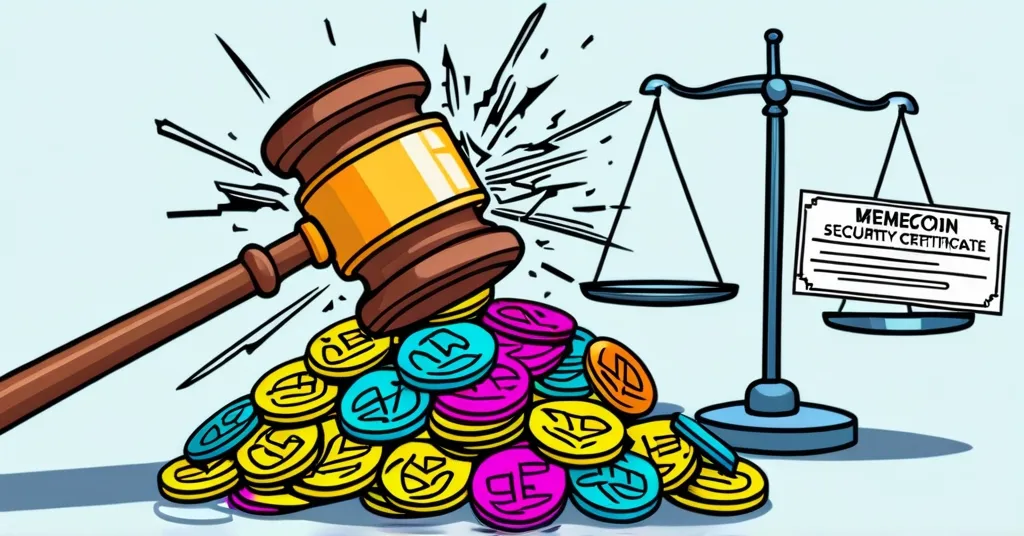Pump.fun Hit with $500M Lawsuit Over Memecoin Securities Claims

Pump.fun Faces $500M Lawsuit: Are Memecoins Securities?
Pump.fun, a popular platform for launching and trading memecoins, is under fire with a class action lawsuit alleging violations of U.S. securities laws. The lawsuit claims Pump.fun has amassed nearly $500 million in fees by facilitating the creation and trading of memecoins, while also questioning whether these digital assets should be classified as securities. Despite the legal challenges, Pump.fun’s transaction volume continues to soar, outpacing major networks like Solana and Ethereum.
- Pump.fun hit with $500M lawsuit
- Accused of violating U.S. securities laws with memecoins
- Transaction volume surpasses Solana and Ethereum
The lawsuit, filed in the Southern District of New York, accuses the U.K.-registered Baton Corporation and its co-founders of acting as a “joint issuer” of memecoins. A “joint issuer” is an entity that helps issue securities, and in this case, the lawsuit claims that all tokens created on Pump.fun’s platform qualify as securities. Diego Aguilar, the lead plaintiff, alleges financial losses from trading Pump.fun-created tokens such as FWOG, FRED, and GRIFFAIN. This legal action could set a precedent for the entire cryptocurrency industry, as memecoins continue to capture the market’s attention.
Despite the legal storm, Pump.fun’s performance remains robust. More transactions happen on Pump.fun than on Solana or Ethereum, with the platform generating $116.72 million in revenue last month and a staggering $1.45 billion in fees over 24 hours. This surge in activity highlights the resilience of the memecoin market and Pump.fun’s dominance within it. Who knew that a digital Shiba Inu could spark such a legal frenzy?
This isn’t Pump.fun’s first brush with legal issues. The platform previously faced lawsuits over the PNUT token, which once hit a $1 billion market cap before plummeting, and the HAWK token, associated with influencer Hailey Welch. These cases underscore a pattern of regulatory scrutiny that memecoins continue to face.
The memecoin sector has experienced significant growth in early 2025, even amidst these legal challenges. However, the regulatory landscape is shifting. The SEC under the Trump administration is reportedly rethinking its approach to crypto regulation, which could have far-reaching implications for platforms like Pump.fun. This potential shift might challenge the sustainability of memecoins and shift investor preferences towards more established cryptocurrencies like Bitcoin.
An X user named Apate pointed out a critical detail in the legal debate over memecoins:
The lawsuit claims that all tokens created on Pump.fun’s platform qualify as securities, and the company has raked in nearly $500 million in fees by enabling users to launch memecoins.
Yet, Apate also noted that memecoins were explicitly excluded from being classified as securities under the 1987 Securities Exchange Act amendment. This contradiction reflects the ongoing legal and regulatory ambiguity surrounding memecoins. Meanwhile, the SEC’s previous loss in a case involving Dogecoin derivatives could influence the outcome of Pump.fun’s lawsuit, adding another layer of complexity to the debate.
While memecoins are often seen as the wild west of crypto, they also embody the thrill of decentralized finance. As one commenter on Investing.com put it, “Memecoins are the wild west of crypto, but they’re also where the fun is.” This sentiment captures the duality of memecoins: exciting yet fraught with risk. The thrill of memecoins comes with legal risks, and the outcome of this lawsuit could reshape the future of cryptocurrency platforms and the memecoin market as a whole.
The debate over whether memecoins are securities is far from settled. Some argue that memecoins, often created as a playful experiment, do not meet the traditional definition of securities. Others point to the speculative nature of these tokens and the significant fees generated by platforms like Pump.fun as evidence that they should be regulated. This legal ambiguity continues to fuel discussions and could lead to further regulatory clarity or chaos in the crypto space.
As we navigate this complex landscape, it’s crucial to stay informed about the lawsuit’s progress and the evolving regulatory environment. The future of memecoins and the platforms that support them hangs in the balance, with potential implications for the entire cryptocurrency industry.
Key Takeaways
- What are the accusations against Pump.fun in the class action lawsuit?
Pump.fun is accused of violating U.S. securities laws by enabling the creation and trading of memecoins, which the lawsuit claims qualify as securities. The platform allegedly amassed nearly $500 million in fees.
- How has Pump.fun’s transaction volume compared to other major networks like Solana and Ethereum?
Despite legal challenges, Pump.fun’s transaction volume has surpassed that of Solana and Ethereum, with $116.72 million in revenue last month and $1.45 billion in fees over 24 hours.
- What is the significance of the SEC’s shift in approach to crypto regulation under the Trump administration?
The shift in SEC policy could potentially impact how platforms like Pump.fun are regulated, affecting the legal landscape for memecoins and other cryptocurrencies.
- Are memecoins considered securities according to current U.S. laws?
There is debate over this issue. An X user named Apate pointed out that memecoins were explicitly excluded from being classified as securities under the 1987 Securities Exchange Act amendment, and noted a previous SEC loss in a case involving Dogecoin derivatives.
- What previous legal battles has Pump.fun faced?
Pump.fun faced lawsuits over the PNUT token, which once hit a $1 billion market cap but later plummeted, and over the HAWK token associated with influencer Hailey Welch.



